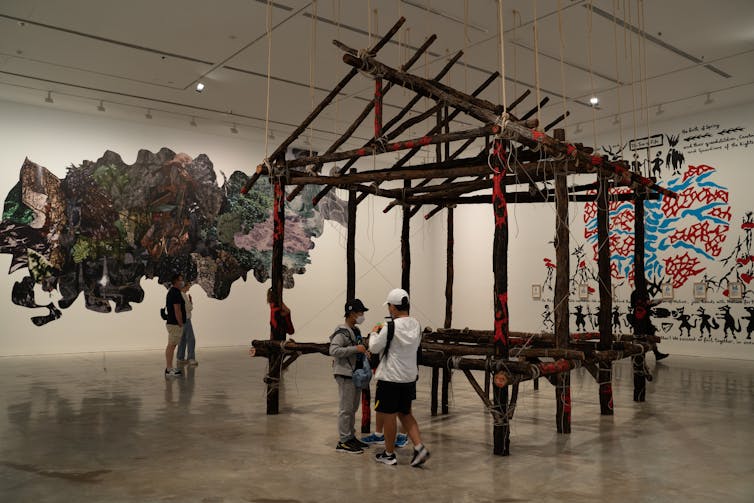With the swearing in of a new arts minister, there is a unique opportunity to address some of the structural issues around pay and job precarity in the arts and build a more equitable and diverse sector.
After holding the shadow portfolios, it is expected Tony Burke will be sworn in as minister for the arts and minister for industrial relations: the first federal minister to hold the pairing of these two portfolios.
A member of parliament since 2004, Burke briefly held the arts portfolio in the Gillard/Rudd ministry before becoming opposition spokesperson in 2016. He became shadow minister for industrial relations in 2019.
Through his time in parliament, Burke has often showcased his passion for the arts on his social media accounts, and he even keeps a selection of guitars in his parliamentary office (where he is known to play with other politicians in a Labor caucus band).
Burke has also long advocated for addressing issues of insecure work and unreliable pay, claiming Labor would launch a senate inquiry into insecure work if elected.
The arts and cultural sector has the dubious title of being an industry leader in insecure work. And it is at the intersection of cultural and industrial relations policy where our new arts minister could dramatically reshape the sector.
A precarious sector
In the final days of the election campaign, the Biennale of Sydney faced criticism after advertising an unpaid internship position.
Offered in partnership with Google Arts and Culture, the position involved cataloguing responsibilities and the creation of original content over the course of three months – all for no pay.
The arts and cultural sector is no stranger to unpaid internships. With limited full-time and salaried positions available, many arts workers use internships and other forms of unpaid labour as a way of gaining a foothold in the industry.
Even once established, arts workers typically rely on a combination of short-term and gig-based work, often at extremely low rates of pay.
Read more:
The crisis of a career in culture: why sustaining a livelihood in the arts is so hard
Arts organisations are often built on a foundation of cheap or free labour. Faced with budget shortfalls and a lack of government support, many organisations have few options but to perpetuate the precarity of work in the sector.
This means taking advantage of workers who are desperate to gain industry experience and build professional networks.
The sector’s reliance on unpaid work has far-reaching consequences for its diversity. With unpaid work a key feature of the industry, arts workers who can’t afford to work for free are essentially forced out of the labour pool. This creates a sector that largely excludes anyone from a working-class background.
Over the past two years, the situation facing arts workers has reached a tipping point. Many artists and arts workers were excluded from receiving JobKeeper or other forms of pandemic support. This led to greater numbers of arts workers abandoning the sector in favour of more stable employment – and an increasingly narrow pool of workers who can afford to stay.
Read more:
The government says artists should be able to access JobKeeper payments. It’s not that simple
An industrial relations approach
As part of their election commitments, the new Labor government said they will again implement a national cultural policy. But it is within his other portfolio that Burke could have the greatest impact on the sector.
When launching Labor’s arts policy at Melbourne’s Esplanade Hotel on May 16, Burke acknowledged cultural policy isn’t just about the arts:
Arts isn’t simply about entertainment, leisure and hobbies. At its best it affects our education policy, our health policy, our trade, our relations around the world, our industrial relations approach and is a driver of economic growth.
The arts and cultural sector have loudly condemned the lack of economic support received over the past decade, as well as during the pandemic.
But arts organisations must also take responsibility for contributing to a labour market environment that exploits workers and creates barriers to workers from diverse socio-economic backgrounds, and Burke needs to hold these organisations to account.

Shutterstock
Considering the inclusion of labour standards within grant agreements could establish a stronger culture of fair pair for all arts workers. Similarly, Burke could institute stronger regulations on the use of internships versus paid work.
Arts work is work and should be compensated accordingly.
The Biennale of Sydney states in the advertisement for its unpaid intern that “art should be accessible to all.” Our incoming arts minister can help to make this a reality, not just for audiences but for workers as well.
Read more:
Wages and women top Albanese’s IR agenda: the big question is how Labor keeps its promises






More Stories
Halogen Vs LED Under Cabinet Lighting
5 Practical And Aesthetically Pleasing Home Renovations And Add-Ons
A Mark of Distinction: Custom Closets and Cabinets